Hyundai i20 range gets a N-Sport derivative
- Engine power increased to 85 kW, torque to 160 Nm
- Lower stance, stiffer suspension for even better road holding
The attractive, popular Hyundai i20 hatchback – launched earlier in 2015 – has received a sporty makeover and a power boost, all contained in a new 1.4-litre derivative in the i20 range which will carry the performance N-logo.
A number of visual enhancements has been added to create the new i20 1.4 N-Series, including new 17-inch alloy rims, a Sport Body kit, a stainless steel free-flow CAT back exhaust system and N-badges on the front mudguards and rear hatchback door. The Sport Body kit consists of side skirts, front and rear bumper trim finishes to carry through the sporty line from the side skirts, and a rear boot spoiler.
Stiffer springs has not only given the i20 1.4 Sport a lower stance on the road, but the suspension tweak is also adding a firmer ride and sporty handling and road holding to the package. The free-flow exhaust system also adds a audible announcement of the added engine power.
“The Hyundai i20 was the perfect model in our range to subject to a sporty makeover – it is a car that appeals to a younger buyer, it has fresh, modern looks and a dashing design, and it already had fine driving characteristics and road manners – something that we enhanced a bit more with the tweaking of the suspension, new alloy rims with low profile tyres and increased engine power output,” says Stanley Anderson, marketing director of Hyundai Automotive South Africa.
The i20 range, designed at Hyundai Motor Company’s European Technical Centre in Rüsselsheim, Germany, was launched in South Africa earlier in 2015 in three derivatives: The i20 1.2 Motion (manual); the i20 1.4 Fluid (manual); and the i20 Fluid equipped with an automatic 4-speed gearbox.
Styling and design
The distinctive design of the i20 at Hyundai Motor’s Design Centre Europe in Rüsselsheim, Germany, was influenced by the latest interpretation of Hyundai Motor’s design philosophy, Fluidic Sculpture 2.0, with its clean and elegant lines.
The body shell incorporates a single feature line running the length of the vehicle just below the windows and connecting at the rear. A waistline moulding at the base of the door creates a sleek profile, which is complemented by the soft, sculptured “undercuts” of the body panels. On the i20 1.4 N-Series this has been further accentuated by the side skirts and bumper trims.
The purposeful appearance of the i20 is emphasised by its long hood, low roofline and sharp crease line that combine to achieve a streamlined vehicle with an aerodynamic drag figure of 0,34 Cd.
Comfort and convenience
The new platform and generous shape of the i20 have been developed using lightweight, high-strength steel to yield stiffer torsional rigidity. The result is an improvement in ride quality, reduction in core weight and gains in damping to mitigate noise, vibration and harshness (NVH).
Throughout the new model, Hyundai engineers have applied technologies aimed at reducing the intrusion of noise and vibration to the cabin. Increased sound-absorption at the base of the A-, B- and C-pillars protects occupants from road vibrations, while a high-density anti-noise pad is fitted within the floor pan to limit noise ingress.
Other new features include automatic folding door mirrors and smartphone docking integration. USB and auxiliary connectivity is fitted as standard with an audio system, along with a Bluetooth hands free phone function and the ability to stream music over the sound system with Bluetooth from a cell phone or music player.
Engines and transmission
The i20 is available with a choice of two Hyundai “Kappa” petrol power plants: A 1 197 cc 4-cylinder and a 1 368 cc four-cylinder engine, both with 4 valves per cylinder and Dual Continuous Variable Valve Timing. Both engines use multi-point electronic fuel injection.
It is the Kappa 1,4 litre engine in the i20 1.4 Fluid manual and 1.4 Fluid automatic (which in its standard version delivers maximum power of 74 kW at 6 000 r/min. and its highest torque output of 133 Nm at 3 500 r/min.) that has been tweaked for the i20 1.4 N-Sport package. Its maximum power output has been lifted to 85 kW for the N-Sport, with a new maximum torque output of 160 Nm.
The tweaked 1,4 litre engine in the i20 N-Series is mated to a six-speed manual gearbox.
Running gear
The i20 sits on fully independent MacPherson strut suspension at the front and semi-independent coupled torsion beam axle at the rear. Hyundai’s engineers have upgraded the two systems to exploit the new car’s larger footprint, its significantly stronger structure and altered weight distribution. Stiffer springs in the i20 1.4 N-Sport has lowered its centre of gravity and contributes to even better road holding.
The 64% stiffer body shell, combined with its longer wheelbase (+45 mm) and increased tracks offer noticeable gains in cornering stability and grip of the i20.
Safety
At the core of the i20, safeguarding above-average impact resistance, is a strong chassis and body shell, which benefits from the extensive use of advanced-high-strength steel (42% of total composition compared with 16% for the original i20).
Every i20 model is fitted with a 4-wheel electronic 4-channel Anti-lock Brake System (ABS), as well as Electronic Brake Force Distribution (EBD). Ventilated disc brakes are used on the front wheels, while the rear wheels are equipped with solid disc brakes.
The i20 features effective passive safety equipment to protect occupants, including a driver and front passenger airbag, with front and rear seatbelt pre-tensioners and a lap belt for the middle passenger in the rear. The height-adjustable head restraints provide protection against whiplash.
Pricing
The price of the i20 N-Series is R235 500, which includes the Hyundai warranty and Roadside Assistance for 5 years or 150 000 km, and a service plan for 3 year or
60 000 km.






